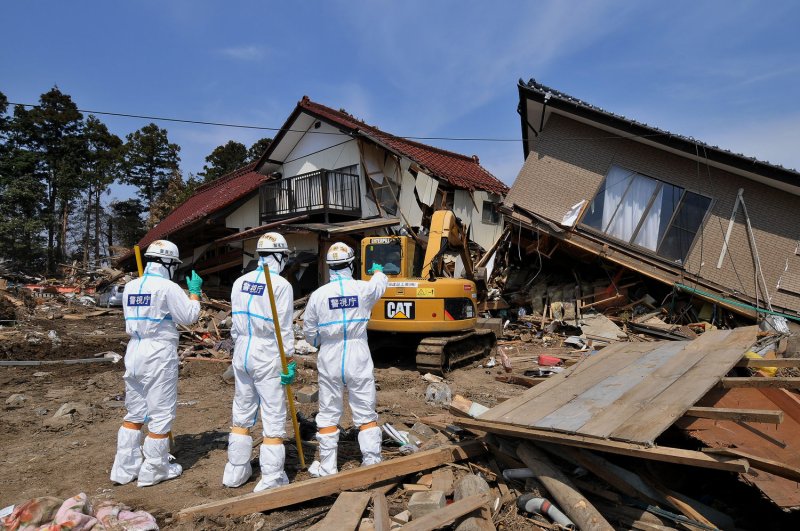Japanese police wearing chemical protection suits search for victims inside the 20 kilometer radius around the Fukushima Daiichi nuclear power plant in Minamisoma, Fukushima prefecture, Japan, on April 15, 2011. A massive earthquake and ensuing tsunami on March 11 destroyed homes, killed thousands and caused a nuclear disaster. File photo by Keizo Mori/UPI |
License Photo
HOUSTON, Aug. 22 (UPI) -- Researchers at the University of Texas Medical Branch have developed a new drug they say can protect victims of nuclear radiation poisoning.
According to the study, the single-dose injectable treatment can counter life-threatening effects of radiation -- especially those involving the gastrointestinal, or GI, tract -- if taken 24 hours after exposure. The research is published in the journal Laboratory Investigation.
The drug in question is the previously developed TP508, used initially to repair skin, bone and muscle tissues. It can stimulate cells to repair tissue by prompting healthy blood flow, lowering inflammation and protecting cells from death.
Researchers injected mice with TP508 24 hours after potentially lethal radiation exposure, and found "significantly" increased survival rates and delayed mortality.
Nuclear radiation exposure can lead to several deadly effects, including the most prevalent GI toxicity syndrome, which results from destruction of the intestinal lining caused by radiation. The gastrointestinal damage decreases a victim's ability to absorb water causing infections, leakage, electrolyte imbalances and death.
"Because radiation-induced damage to the intestines plays such a key role in how well a person recovers from radiation exposure, it's crucial to develop novel medications capable of preventing GI damage," says UTMB adjunct professor Darrell Carney.
Lead researcher Carla Kantara said her team's results from experimenting with TP508 "suggest that the peptide may be an effective emergency nuclear countermeasure that could be delivered within 24 hours after exposure to increase survival and delay mortality, giving victims time to reach facilities for advanced medical treatment."
The National Institutes of Health and the UTMB Jeane B. Kempner Scholarship financially supported the team's research.















